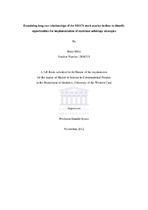Examining long-run relationships of the BRICS stock market indices to identify opportunities for implementation of statistical arbitrage strategies
Abstract
Purpose:This research investigates the existence of long-term equilibrium relationships among the stock market indices of Brazil, Russia, India, China and South Africa (BRICS). It further investigates cointegrated stock pairs for possible implementation of statistical arbitrage trading techniques.Design:We utilize standard multivariate time series analysis procedures to inspect unit roots to assess stationarity of the series. Thereafter, cointegration is tested by the Johansen and Juselius (1990) procedure and the variables are interpreted by a Vector Error Correction Model (VECM). Statistical arbitrage is investigated through the pairs trading technique.Findings:The five stock indices are found to be cointegrated. Analysis shows that the cointegration rank among the variables is significantly influenced by structural breaks. Two pairs of stock variables are also found to be cointegrated. This guaranteed the mean reversion property necessary for the successful execution of the pairs trading technique. Determining the optimal spread threshold also proved to be highly significant with respect to the success of this trading technique.Value:This research seeks to expand on the literature covering long-run co-movements of the volatile emerging market indices. Based on the cointegration relation shared by the BRICS, the research also seeks to encourage risk taking when investing. We achieve this by showing the potential rewards that can be realized through employing appropriate statistical arbitrage trading techniques in these markets.

